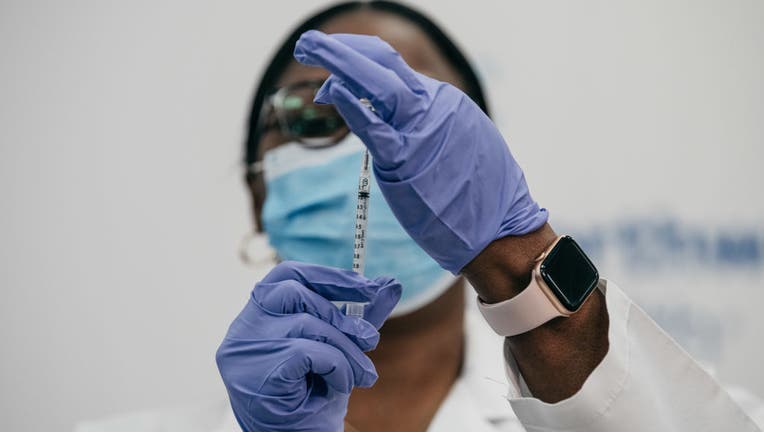People over 75, essential workers next in line for COVID-19 vaccine

NEW YORK, NY - DECEMBER 14: Doctor Michelle Chester prepares to administer the COVID-19 vaccine at Long Island Jewish Medical Center on December 14, 2020 in New Hyde Park on Long Island, New York. The first vaccination was administered to Registered
NEW YORK - An expert committee put people 75 and older and essential workers like firefighters, teachers and grocery store workers next in line to receive a COVID-19 vaccine shot.
This comes as a second vaccine began rolling out Sunday to hospitals, a desperately needed boost as the nation works to bring the coronavirus pandemic under control.
The developments occurred as the nation seeks to ramp up a vaccination program that only began in the last week and so far has given initial shots to about 556,000 Americans, according to the Centers for Disease Control and Prevention.
The vaccines from Pfizer Inc. and Germany’s BioNTech, as well as the one from Moderna Inc., which was approved by regulators last week, go first to health care workers and residents of long-term care homes based on the advice of the Advisory Committee on Immunization Practices.
The committee voted 13-1 on Sunday to put people 75 and older as well as certain front-line workers next in line for the vaccines.
Those essential workers include firefighters and police officers; teachers and school staff; food and agriculture workers; manufacturing workers; corrections workers; U.S. Postal Service workers; public transit and grocery store workers.
The committee also voted that behind those groups should be other essential workers; people ages 65 to 74; and those aged 16 to 64 who have certain medical conditions — like obesity and cancer — that put them at higher risk for severe disease if they get infected with COVID-19.
The expert panel’s recommendation next goes to the CDC director and to states as guidance to put together vaccination programs. CDC directors have almost always signed off on committee recommendations. No matter what the CDC says, there will be differences from state to state, because various health departments have different ideas about who should be closer to the front of the line.
Pfizer’s shots were first shipped out a week ago and started being used the next day, kicking off the nation’s biggest vaccination drive.
RELATED: Shipments begin for Moderna's COVID-19 vaccine
Earlier Sunday, trucks left the Olive Branch, Mississippi, factory, near Memphis, Tennessee, with the vaccine developed by Moderna and the National Institutes of Health. The much-needed shots are expected to be given starting Monday, just three days after the Food and Drug Administration authorized their emergency rollout.
In Louisville, Kentucky, UPS driver Todd Elble said his vaccine shipment was the "most important load that I’ve hauled" in a 37-year career. His parents contracted COVID-19 in November, and his 78-year-old father died. He said the family speculates that his father got infected while traveling on a hunting trip with four other relatives to Wyoming, and some are still sick.
"I’m going to take the vaccine myself. I’m going to be first in line for my father — I’ll tell you that much — and any others that should follow," he said. "I feel in my heart that everybody should, to help get this stopped."
He added: "To bring this back, I feel Dad was in the truck with me today."
Dr. Moncef Slaoui, the chief science adviser to the federal government’s vaccine distribution effort, said on CNN’s "State of the Union" that nearly 8 million doses will be distributed Monday, about 5.9 million of the Moderna vaccine and 2 million of the vaccine from Pfizer Inc. He said the first Moderna shots should be given Monday morning.
Also on Sunday, an expert committee began considering who should be next in line for early doses of the Moderna vaccine and the one from Pfizer and Germany’s BioNTech. Pfizer’s shots were first shipped out a week ago and started being used the next day, kicking off the nation’s biggest vaccination drive.
Public health experts say the shots — and others in the pipeline — are the only way to stop a virus that has been spreading wildly. Nationwide, more than 219,000 people per day on average test positive for the virus, which has killed over 316,000 in the U.S. and nearly 1.7 million worldwide.
RELATED: Stay up to date on all coronavirus-related information
Slaoui also predicted the U.S. will experience "a continuing surge," with larger numbers of coronavirus cases possible from gatherings for Christmas.
"I think, unfortunately, it will get worse," he said.
The Pfizer and Moderna shots shipped so far and in the next few weeks are nearly all going to health care workers and residents of long-term care homes, based on the advice of the Advisory Committee on Immunization Practices.
There won’t be enough shots for the general population until spring, so doses will be rationed at least for the next several months. President-elect Joe Biden pledged earlier this month to have 100 million doses distributed in his first 100 days in office, and his surgeon general nominee said Sunday that it’s still a realistic goal.
Get your top stories delivered daily! Sign up for FOX 11’s Fast 5 newsletter. And, get breaking news alerts in the FOX 11 News app. Download for iOS or Android.

